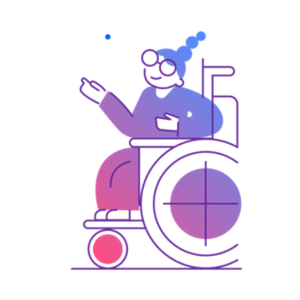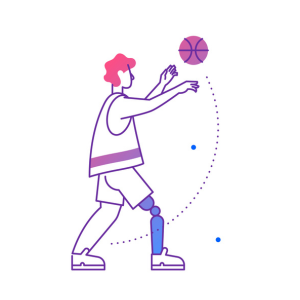Children with disability
Information on diagnosis, rights and services for children with disabilities and their families.
Shortcuts
What is disability?
Disability can be varied and have different levels of impact. The main disabilities of children are intellectual disability, autism and physical disability.
Disability can be diagnosed at birth or later in life. Some disabilities are obvious and easy to diagnose, while others take time to appear and are therefore often diagnosed later. Disability can also be a result of accidents.
The diagnosis and service for children with disability is defined in three levels, represented as levels 1 - 3 in the diagnosis and service processes. The first level is for general assessments, where there is a suspicion of disability but it is not confirmed. If the results of the assessments is a diagnosis of disability it will be assessed as a level two or three, and resources/services allocated according to the needs of the child at each time.
Children who are diagnosed as disabled at birth receive services from the Counseling and Diagnostic Center in collaboration with institutions such as the Children's Hospital or SLF's Rehabilitation Center. Younger children receive various training and education by the Counseling and Diagnostics Center and parents receive advice and education. The staff monitors the children's development, and when children are two years old or start in preschool, a formal assessment of their development is often conducted.

Initial assessment
When parents or guardians suspect that a child may have a potential disability, the first step is often to seek advice within the child's immediate environment.
Who to contact?
Subsequently, these individuals can submit an application for the child's situation to be further assessed by a school psychologist, who conducts what is called an initial assessment.
Initial assessment is the first step in the diagnostic process for children. The initial assessment is conducted by a school psychologist from the service center of the respective municipality.
Initial assessment may include:
Interview with parents where questions are asked about the child's developmental, health, and family history.
A evaluation checklist is given to parents and teachers. Among other things, symptoms of ADHD and autism are screened, and questions are asked about behavior and well-being
The school psychologist visits the child's preschool or school and observes the child in their immediate environment.
The child's cognitive development is mapped (WISC-IV test).
When these results are available, the school psychologist meets with parents and presents them with a report containing the results. The results are reviewed and the possible resources and interventions that can be installed are discussed.
If indications of symptoms that may suggest ADHD, autism, intellectual disability, oppositional defiant disorder, or behavioral disorder are found, a referral is sent to the Children's Mental Health Center or the Consulting and Diagnostic Center (RGR) for further assessment
Click here to see a video from the Consulting and Diagnostic Center that describes the process from the suspicion of developmental deviations in the child until the diagnosis is completed.
Diagnosis
After the initial assessment is completed, a meeting is held with the pre- or primary school and the parents/family members where the results of the diagnosis are disclosed. If the results require further assessment, the child's case is referred to either the Children's Mental Health Center, which conducts second-level assessments, or to the Counseling and Diagnostic Centre, which conduct third-level assessments.
In the meeting with the parents/family members, the next steps are discussed and they are informed about the service process and the expected waiting time if further assessment is needed.
The diagnosis process often includes a questionnaire for parents, interviews with specialists, for example with social workers and doctors, various inspections and involvement of different assessment individuals, for example doctors, speech therapists or physical therapists. After the diagnosis process, a meeting is held with the parents/family members of the child where they are informed about the results of the diagnosis and advised on services and the next steps. When a formal diagnosis has been confirmed, it is recommended that parents contact social workers in their municipality for further information on their rights, service resources and support options available within the municipality.
Click here to watch a video from the Consulting and Diagnostic Center (RGR) about the diagnosis process.
For more information:
School services
All children have the right to support in education that meets their needs. Municipalities are responsible for providing children with disabilities with the necessary assistance in pre-, primary and secondary schools, including special education, counselling and individualized solutions.
Click here to read more on the regulations on municipal school services for preschools and primary schools and the Student Protection Council in primary schools.
Rights of children with disabilities
Disabled children have various rights that parents can utilize. To find out what rights are available to the child in their municipality, individual counseling with a social service advisor is required. The counseling is free of charge for families and relatives. The advisor can also provide advice on school options, rights, and services, as well as help with filling out applications.

Service
Children with disability have the right to a wide range of services that support their development and daily life. These services include speech, occupational and physical therapy, individual support, short-term stay and driving services, all with the aim of enhancing their skills and quality of life.

Sports and recreation
A variety of recreational activities are offered for children with disabilities in the capital area.
Community centers and recreational activities
Sports clubs
Swimming pools in Iceland and accessibility
Access to swimming pools varies. It is good to call swimming pools beforehand and see how the facilities are for people with disability. Here are some swimming pools with good access according to a survey made in March 2025:
Institutions and organizations
Various institutions and organizations provide children with disabilities and their families with services, education, and support.
Organizations that carry out diagnosis
The Children’s Mental Health Centre and the Counseling and Diagnostic Centre provide a number of services to children with disabilities and conduct assessments as needed following the initial assessment. Children born with disabilities receive services from the Counseling and Diagnostic Centre immediately.
The Paralytic and Disabled Support Association (SLF) is a non-profit organization that provides support and services to children with disability and their families. The association operates, among other things, Æfingastöðin, where medical and occupational training is offered, and Reykjadalur, a summer camp for children and young adults with disabilities. SLF also works to improve education and services for people with disabilities.
Other institutions and organizations that provide services and guidance
Laws and regulations
The content on this page is based on information provided by Þroskahjálp. For further information or feedback, please contact Þroskahjálp at throskahjalp@throskahjalp.is.